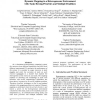Free Online Productivity Tools
i2Speak
i2Symbol
i2OCR
iTex2Img
iWeb2Print
iWeb2Shot
i2Type
iPdf2Split
iPdf2Merge
i2Bopomofo
i2Arabic
i2Style
i2Image
i2PDF
iLatex2Rtf
Sci2ools
119
click to vote
IPPS
2003
IEEE
2003
IEEE
Dynamic Mapping in a Heterogeneous Environment with Tasks Having Priorities and Multiple Deadlines
In a distributed heterogeneous computing system, the resources have different capabilities and tasks have different requirements. To maximize the performance of the system, it is essential to assign resources to tasks (match) and order the execution of tasks on each resource (schedule) in a manner that exploits the heterogeneity of the resources and tasks. The mapping (defined as matching and scheduling) of tasks onto machines with varied computational capabilities has been shown, in general, to be an NP-complete problem. Therefore, heuristic techniques to find a near-optimal solution to this mapping problem are required. Dynamic mapping is performed when the arrival of tasks is not known a priori. In the heterogeneous environment considered in this study, tasks arrive randomly, tasks are independent (i.e., no communication among tasks), and tasks have priorities and multiple deadlines. This This research was supported in part by the Colorado State University George T. Abell Endowment...
Distributed And Parallel Computing | Heterogeneous Computing System | IPPS 2003 | Resources | Varied Computational Capabilities |
Related Content
| Added | 04 Jul 2010 |
| Updated | 04 Jul 2010 |
| Type | Conference |
| Year | 2003 |
| Where | IPPS |
| Authors | Jong-Kook Kim, Sameer Shivle, Howard Jay Siegel, Anthony A. Maciejewski, Tracy D. Braun, Myron Schneider, Sonja Tideman, Ramakrishna Chitta, Raheleh B. Dilmaghani, Rohit Joshi, Aditya Kaul, Ashish Sharma, Siddhartha Sripada, Praveen Vangari, Siva Sankar Yellampalli |
Comments (0)

